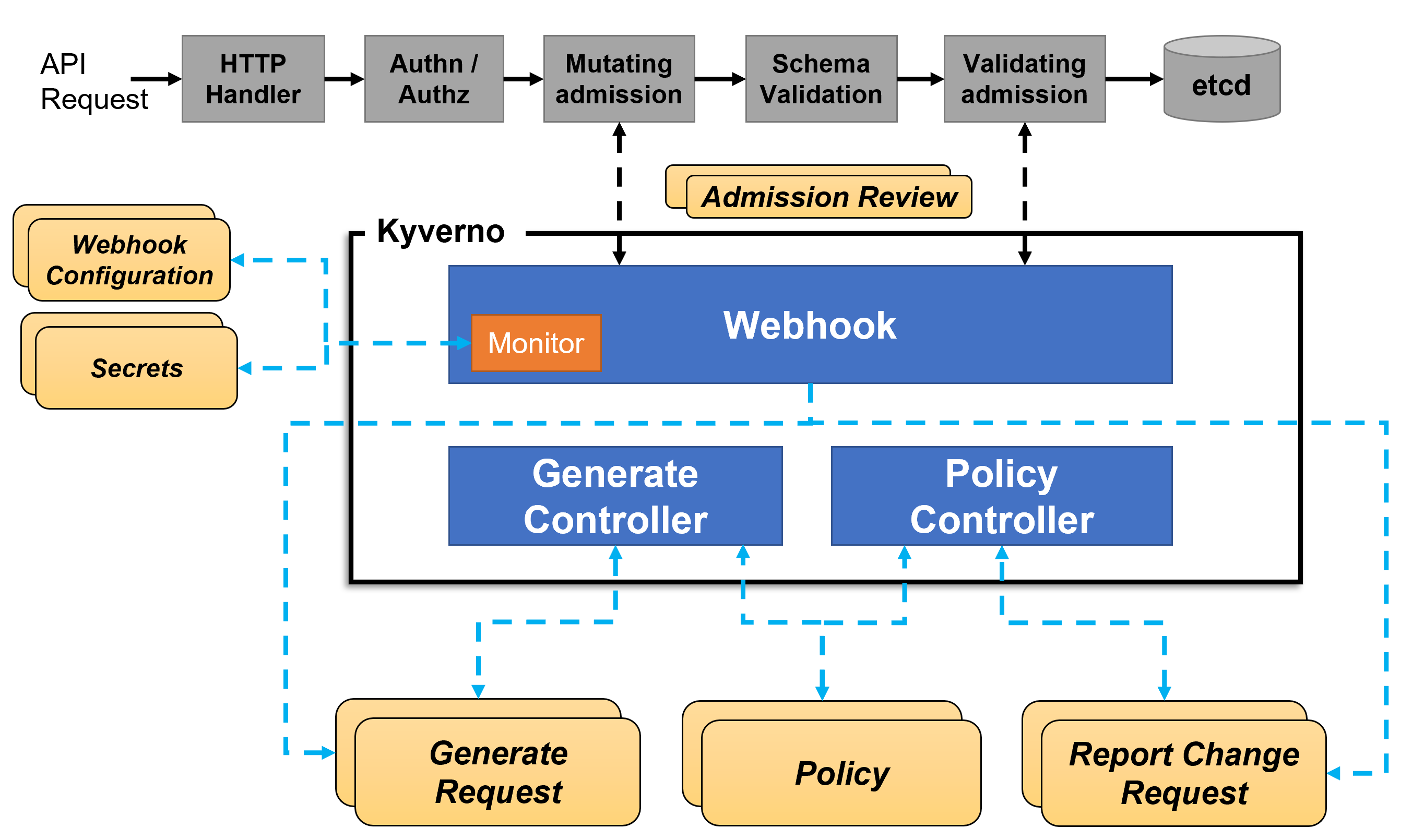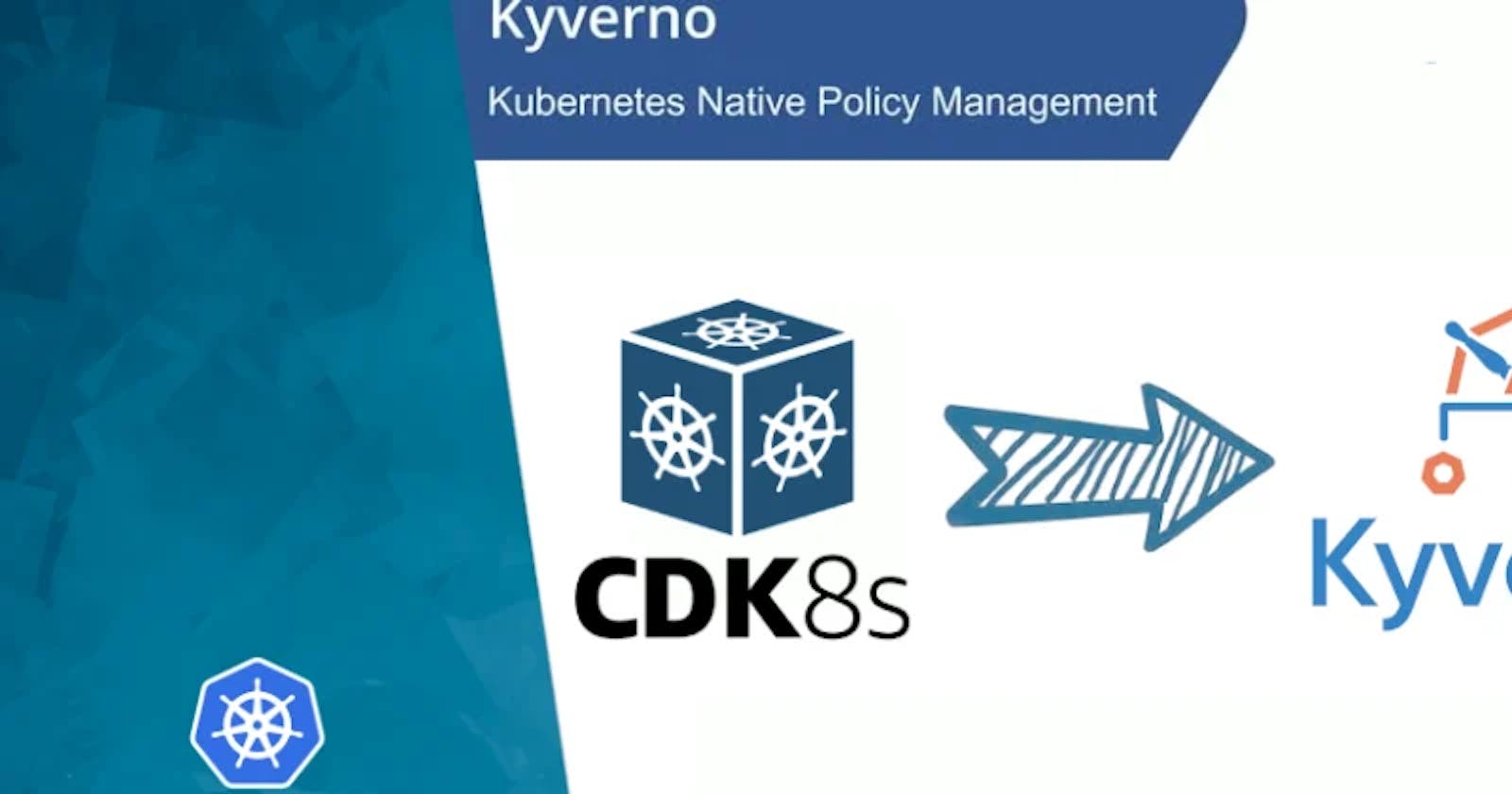Abstract
Kyverno Kyverno is a policy engine designed for Kubernetes, Kyverno policies can validate, mutate, and generate Kubernetes resources plus ensure OCI image supply chain security.
This blog, it provides the way to create Kyverno policy as code using CDK8S typescript.
By importing Kyverno CRDs and using CDK8S you can create Kyverno policy manifest using your familiar programming languages such as typescript as scale.
Table Of Contents
🚀 Pre-requisite
Install typescript, node, and cdk8s as well as projen (optional) which is a tool for managing project configuration as code.
EKS/kubernetes cluster to test
🚀 Overview of Kyverno
The features are
Policies as Kubernetes resources in YAML
Validate, mutate, or generate any resource using Kustomize overlays
Match resources using label selectors and wildcards
Block non-conformant resources using admission controls, or report policy violations
Test policies and validate resources using the Kyverno CLI, in your CI/CD pipeline, before applying them to your cluster
How does it work?

🚀 Import Kyverno CRDs
- Import kyverno CRDs as cdk8s lib
⚡ $ cdk8s import https://raw.githubusercontent.com/kyverno/kyverno/main/config/crds/kyverno.io_clusterpolicies.yaml --output src/imports/
Importing resources, this may take a few moments...
kyverno.io
kyverno.io/clusterpolicy
Output of importing
⚡ $ tree src/imports/ src/imports/ └── kyverno.io.ts 0 directories, 1 file
🚀 Write code
It's much more convenient to use visual code writing Kyverno policies in typescript language. We can read the document and find all references of construct, objects and properties of Kyverno policies through code descriptions.
On top of all policies, there's a simple construct (feel free to implement more the construct) so that each policy just needs to input
name,pattern, etc.The interface of kyverno properties
export interface KyvernoProps { name: string; message: string; namespace?: string; action?: ClusterPolicySpecValidationFailureAction; kinds?: Array<string>; resources?: {}; exclude?: ClusterPolicySpecRulesExclude; deny?: ClusterPolicySpecRulesValidateDeny; pattern?: {}; anyPatterns?: {}; };The constructed class
export class KyvernoClusterPolicy extends Chart { constructor(scope: Construct, name: string, kyvernoProps: KyvernoProps) { super(scope, name); new ClusterPolicy(this, `${kyvernoProps.name}`, { metadata: { name: kyvernoProps.name, namespace: kyvernoProps.namespace || undefined, annotations: { 'policies.kyverno.io/category': 'Pod Security Standards', }, }, spec: { validationFailureAction: kyvernoProps.action || ClusterPolicySpecValidationFailureAction.ENFORCE, rules: [{ name: kyvernoProps.name, match: { any: [{ resources: kyvernoProps.resources || { kinds: ['Pod'] }, }], }, validate: { deny: kyvernoProps.deny || undefined, message: kyvernoProps.message, pattern: kyvernoProps.pattern || undefined, anyPattern: kyvernoProps.anyPatterns || undefined, }, exclude: kyvernoProps.exclude || undefined, }], }, }); } }
This blog provides examples of 5 use cases
[Restart Deployment On Configmap Change]
🚀 Build Kyverno policy from code
Source code:
⚡ $ tree src/ src/ ├── imports │ └── kyverno.io.ts ├── kyverno-policies │ ├── deny-delete-resources.ts │ ├── kverno-list.ts │ ├── kyvernoProps.ts │ ├── require-app-labels.ts │ ├── require-requests-limits.ts │ └── require-runasnonroot.ts ├── main.ts └── test-yaml ├── inflate-negative-test-deployment.yaml └── inflate-positive-test-deployment.yaml 3 directories, 10 filesBuild
⚡ $ npx projen build 👾 build » default | ts-node --project tsconfig.dev.json .projenrc.ts 👾 build » compile | tsc --build 👾 build » post-compile » synth | cdk8s synth No manifests synthesized 👾 build » test | jest --passWithNoTests --all --updateSnapshot No tests found, exiting with code 0 ----------|---------|----------|---------|---------|------------------- File | % Stmts | % Branch | % Funcs | % Lines | Uncovered Line #s ----------|---------|----------|---------|---------|------------------- All files | 0 | 0 | 0 | 0 | ----------|---------|----------|---------|---------|------------------- 👾 build » test » eslint | eslint --ext .ts,.tsx --fix --no-error-on-unmatched-pattern src test build-tools projenrc .projenrc.tsOutput yaml files
⚡ $ tree dist/ dist/ └── kyverno ├── require-app-label-kyverno-policy.yaml ├── require-request-limit-kyverno-policy.yaml └── run-as-non-root-kyverno-policy.yaml 1 directory, 3 files
🚀 Apply and test
Apply policies and check the result
⚡ $ kubectl apply -f dist/kyverno/ clusterpolicy.kyverno.io/require-app-label configured clusterpolicy.kyverno.io/require-request-limit configured clusterpolicy.kyverno.io/run-as-non-root configuredTest negative, the deployment
inflate-negative-test-deployment.yamldoes not have resource limit and request and enablerunAsNonRoot⚡ $ kubectl apply -f src/test-yaml/inflate-negative-test-deployment.yaml Error from server: error when creating "src/test-yaml/inflate-negative-test-deployment.yaml": admission webhook "validate.kyverno.svc-fail" denied the request: policy Deployment/default/inflate-negative-test for resource violations: require-app-label: {} require-request-limit: autogen-require-request-limit: 'validation error: All containers must have CPU and memory resource requests and limits defined. rule autogen-require-request-limit failed at path /spec/template/spec/containers/0/resources/limits/'Test positive
kubectl apply -f src/test-yaml/inflate-positive-test-deployment.yaml deployment.apps/inflate-positive-test createdTest without non-root user enabled because the validation failure action is
AUDITso the deployment is applied successfully⚡ $ kubectl apply -f src/test-yaml/inflate-without-nonroot-test-deployment.yaml deployment.apps/inflate-without-nonroot-test createdBut let's view the policy violations
⚡ $ kubectl describe polr polr-ns-default | grep inflate -A15 -B10| grep "Result: \+fail" -B10 Seconds: 1661326749 Category: Pod Security Standards Message: validation error: Containers must be required to run as non-root users. This policy ensures runAsNonRoot is set to true. rule autogen-run-as-non-root[0] failed at path /spec/template/spec/securityContext/runAsNonRoot/ rule autogen-run-as-non-root[1] failed at path /spec/template/spec/containers/0/securityContext/ Policy: run-as-non-root Resources: API Version: apps/v1 Kind: Deployment Name: inflate-without-nonroot-test Namespace: default UID: b05068c1-425c-41f4-ae0f-c913100a1c9c Result: fail
🚀 Test Restart Deployment On Configmap Change
Changing configmap requires rollout restart of deployments which reference to that configmap. We can use kyverno to automate this for us.
Create kyverno policy to watch a
Configmapand if it changes will write an annotation to one or more target Deployments thus triggering a new rollout and thereby refreshing the referredConfigmapFirst we need to grant additional privileges to the Kyverno ServiceAccount for updating
apps.deploymentsresources throughAggregated ClusterRolesKyverno has clusterrole with
aggregationRulewhich will combine all clusterrole with labelapp: kyvernointo one in aggregationaggregationRule: clusterRoleSelectors: - matchLabels: app: kyvernoCreate a new kyverno cluster role to inject into the main one kyverno-clusterrole.ts.
Kyverno policy to Restart Deployment On Configmap Change: restart-on-configmap-changes.ts
Rebuild the project to generate manifest yaml files.
npx projen build⚡ $ tree dist/ dist/ ├── kyverno │ ├── require-app-label-kyverno-policy.yaml │ ├── require-request-limit-kyverno-policy.yaml │ ├── restart-on-configmap-change-policy.yaml │ └── run-as-non-root-kyverno-policy.yaml └── role └── kyverno-create-deployments-clusterrole.yaml 2 directories, 5 filesApply
clusterroleand policy then test usinginflate-positive-test-deployment.yamlandinflate-test-configmap.yaml⚡ $ kv7 get cpol restart-on-configmap-change NAME BACKGROUND ACTION READY restart-on-configmap-change true audit true ⚡ $ kv7 get deploy -l app=inflate-positive-test NAME READY UP-TO-DATE AVAILABLE AGE inflate-positive-test 1/1 1 1 62m ⚡ $ kv7 get cm -l app=inflate-test-configmap NAME DATA AGE inflate-test-configmap 2 64mWe now update the configmap to see kyverno rollout restart the deployment
⚡ $ kv7 apply -f inflate-test-configmap.yaml configmap/inflate-test-configmap configured ~ $ kv7 get pod -l app=inflate-positive-test --watch NAME READY STATUS RESTARTS AGE inflate-positive-test-668477b686-cdggl 1/1 Running 0 3m3s inflate-positive-test-59bb77549c-lxcjx 0/1 Pending 0 0s inflate-positive-test-668477b686-cdggl 1/1 Terminating 0 3m9s inflate-positive-test-59bb77549c-lxcjx 0/1 Pending 0 0s inflate-positive-test-59bb77549c-lxcjx 0/1 ContainerCreating 0 0s inflate-positive-test-59bb77549c-lxcjx 1/1 Running 0 1s inflate-positive-test-668477b686-cdggl 1/1 Terminating 0 3m11s inflate-positive-test-668477b686-cdggl 1/1 Terminating 0 3m11s
🚀 Conclusion
Someone said
Kyverno policy as codebut the code is in yaml language, it's not an actual programming language.Using CDK8S to generate Kyverno policy help to leverage the strong programming skill of the developer and structure project more efficiently.

